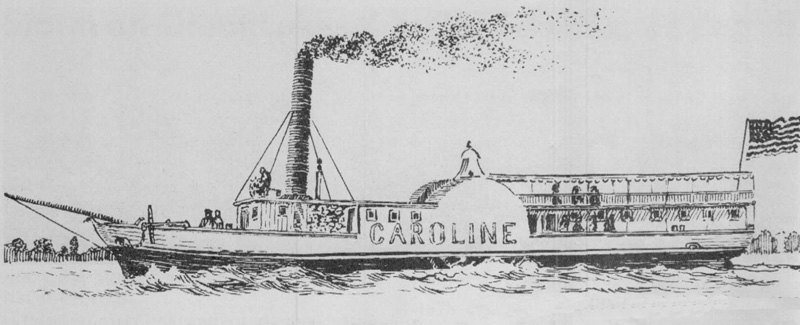
HISTORICAL EVENTS THAT TOOK PLACE ON THIS DAY IN CANADA
12 November

W. L. Mackenzie's supply ship, Caroline, 1840
Raiding Party Sends Caroline Over Niagara
Although Britain and the United States have not fought each other since the War of 1812, there have been a number of occasions since then when war was narrowly averted. One of them resulted from an incident on November 12, 1840, which seems trivial today.
After the collapse of the Upper Canada Rebellion in 1837, W. L. Mackenzie established a base on Navy Island above Niagara Falls and raided Canada. Allan MacNab, who later became Prime Minister of Canada, led a raiding party to the American shore, captured Mackenzie's supply ship Caroline, and sent it over the falls. An American was killed in the fighting, and this caused great anger in the State of New York.
The Brotherhood of Hunters, who were responsible for aiding Mackenzie, took their revenge by attacking and burning a Canadian ship in the St. Lawrence River; but feelings were still inflamed in 1840, when a Canadian, Alexander McLeod, boasted in a New York saloon that he had killed the American on the Caroline. He was promptly arrested and put on trial for murder. The Foreign Secretary, Lord Palmerston, held that the raid on the Caroline had been legal because in aiding the rebels in Canada, it was committing an act of piracy. McLeod had done his duty, acting under military instructions.
The dispute became so heated that Palmerston instructed the British ambassador in Washington to tell the American Government that "war, immediate and frightful in its character," would follow if McLeod were executed. Palmerston's note was so severe that it might have provoked the States to declare war and attack Canada. McLeod was acquitted and released and Britain made a mild apology to the States for the raid on the Caroline.
OTHER NOTABLE EVENTS ON THIS DAY IN CANADIAN HISTORY
12 November
-1774 British citizens in Quebec protested the Quebec Act which restored French civil law.
-1820 The Presbyterians of Quebec and Montreal petitioned for a share of the clergy reserves.
-1856 The Grand Trunk Railway was opened from Quebec to Toronto.
-1921 Sir Robert Borden, who had resigned as prime minister in July, 1920, represented Canada at a conference in Washington to limit armaments.
-1962 The International Exhibition Bureau approved Montreal as the site for the World's Fair in 1967 (Expo '67).